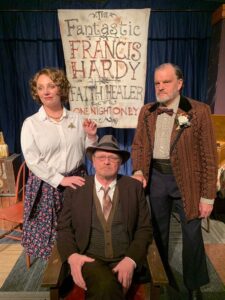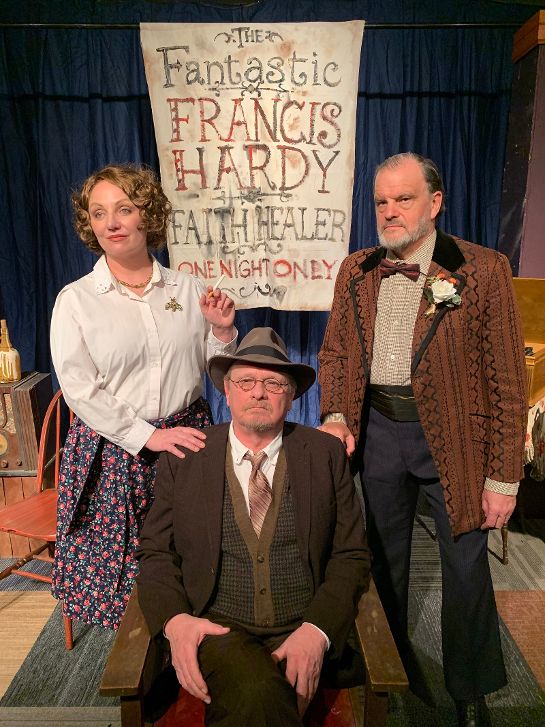Well, what to say? I just saw a play that has, over the years since it debuted in 1979, showcased some of the finest actors of our times. After 2 hours of soliloquies, which even Shakespeare never burdened his audience with, I said to myself ‘what the hell was all that about?’
First, a word about the great actors in Faith Healer. The role of faith healer Francis Hardy was first played by James Mason. In 2006 Ralph Fiennes was cast as Frank, and in 2020 the role went to Michael Sheen. For this production the lead was filled by Rick Smith, who has many stage credits in Texas and California, as well as roles on TV.
There are two other actors in the play produced by City Theatre Austin. Dawn Erin plays Grace, the psychologically abused wife of Frank; and Steve Wright plays Teddy, Frank’s manager who presumably books the dates and venues for Frank to perform his (fake) faith healing shows in Wales, Scotland and Ireland.
Frank’s character is wreathed in mystery. He admits “I’m not respectful but I do not mock.” Grace tells the audience “He had a talent for hurting me, including calling me his mistress!” He was in such complete mastery before a performance that he literally “obliterated” her existence.
“Frank judges people by some inner standard of excellence of his own,” explained Grace. “As this standard changed, so did the person.” Thus his recollection of a person morphed over time so that people became something other than what they were.
While this might be grist for the mill of an aberrant psychology course, here it is a burden shifted onto the shoulders of the audience. There is never any interaction between the characters. Each propounds their view of their shared personal history in long declaratory passages that ultimately become an endurance test for the captive watchers. I think I read somewhere the harangues have been used as a form of verbal torture in prison.
For all the baring of the souls, one can find little to sympathise with here. None of the characters are angels. The play was characterized by one onlooker as a Benadryl moment; another compared it to a cup of bitter coffee.
This is a very different type of play. Usually a play builds to a crescendo or to a problem that’s solved. But in this alcohol-filled play I don’t think anyone had enough sober sense to solve a simple question, much less the Rubik’s cube of interpersonal relationships that are on display. There is no psychological equilibrium amongst the characters.
The portrayals of these miserable, wretched characters was done with aplomb by the cast, whose talent was quite apparent. The performance of Grace so impressed one member of the audience that she plans on attending more plays in which Erin will be featured. Her assessment of this play? “It’s holding my attention, but it’s a downer.”
The printed programme helpfully provides a glossary for Americans who don’t know the geography and language spoken in the play (which includes a bit of Latin and French). It’s a fine glossary, except that bedsit is mis-spelled bedsitter! This was done by Friel himself, who wrote bedsitter, so it’s not an error in the programme.
Faith Healer (the first play of the 17th season for City Theatre) was written by Brian Friel (1929-2015). It is on stage thru Dec. 11, 2022; directed by Andy Berkovsky.

